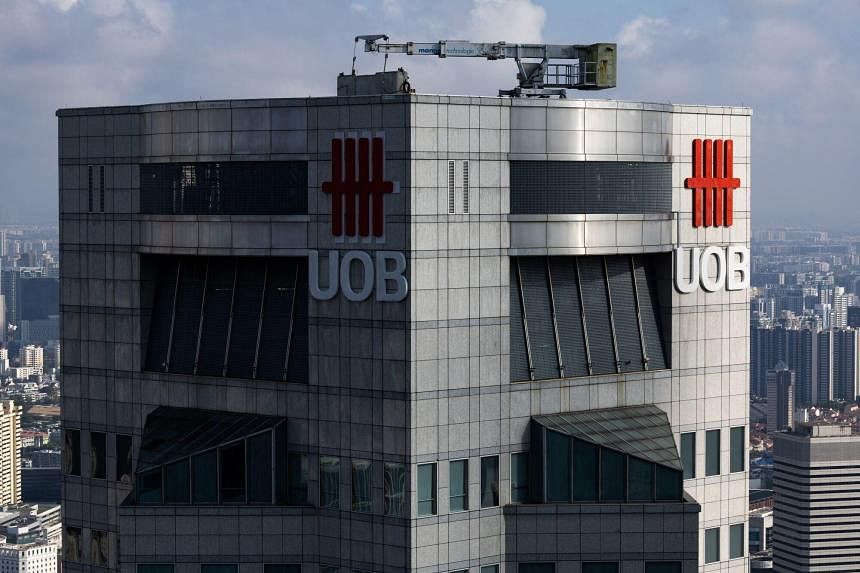SINGAPORE – UOB chief executive Wee Ee Cheong said 2023 was a challenging year amid a slowdown in global demand, more geopolitical tensions, sticky inflation and higher interest rates.
“We expect some of this to persist this year, but the impact should be manageable,” said Mr Wee, adding that while the global economic outlook remains uncertain in the near term, South-east Asia continues to be a bright spot.
“Domestic demand remains robust, tourism is recovering well and the region is still a magnet for manufacturing investments as MNCs (multinational corporations) diversify their supply chains,” Mr Wee said at his first results briefing since the death of his father, former UOB chief executive and chairman Wee Cho Yaw, on Feb 3.
Asked about succession planning and what will happen to the late Mr Wee’s stake in the bank, the chief executive noted that the late Mr Wee had not been involved in the bank’s operations for eight to 10 years.
Most of his stake is in the family’s companies, and his personal stake will most likely be distributed to his children and grandchildren.
“When we talk about succession planning, we are growing our own timber. If the family members are interested, they’re more than welcome. But I think they need passion, love and the desire to be part of the team. In the meantime, I’m growing my timber professionally,” said Mr Wee.
His brothers – Mr Wee Ee Chao and Mr Wee Ee Lim – hold positions in UOB and are substantial shareholders. They are also on the board of leisure and healthcare group Haw Par Corp, famed for its Tiger Balm ointment.
Meanwhile, Mr Wee Ee Cheong’s elder son, Teng Wen, is managing partner of hospitality company The Lo & Behold Group. His other son, Teng Chuen, left the bank to join a real estate investment company. He was previously in UOB’s corporate banking division and also co-founded laundry services company For The Love of Laundry.
UOB’s earnings were lifted towards the end of 2023 by strong growth in credit card fees and a recovery in wealth management fees, even as the tailwind from high interest rates disappeared.
Net profit for the three months to December 2023 rose 22 per cent to $1.4 billion from $1.15 billion a year earlier. Excluding one-off expenses from the acquisition of Citigroup’s consumer banking business in four South-east Asian markets, earnings rose 7 per cent to $1.5 billion.
The numbers are in line with an average forecast of $1.5 billion from analysts polled by Bloomberg.
The board recommended a final dividend of 85 cents per share, bringing the total dividend for the whole of 2023 to $1.70. This represents a payout ratio of about 50 per cent.
Fourth-quarter net interest income fell 6 per cent from a year earlier to $2.4 billion, reversing a boost from high interest rates, which had increased margins but also weighed on loan growth.
Group chief financial officer Lee Wai Fai said there was pressure on margins due to competition for good-quality credit, as well as a pickup in funding costs on deposits.
For the whole of 2023, the bank’s net interest margin – a key gauge of profitability – rose 23 basis points to 2.09 per cent, but loans grew by just 2 per cent in constant-currency terms.
Fourth-quarter fee income rose 17 per cent to $569 million, buoyed by credit card fees as the bank’s franchise grew after the acquisition of Citi’s consumer units, as well as wealth management fees as investor sentiment recovered.
Other non-interest income surged 54 per cent to $438 million on higher customer-related treasury income and strong performance from trading and liquidity management activities.
Total allowances, set aside for potential bad loans, fell 18 per cent mainly owing to lower specific provisions.
Asked about UOB’s exposure to China’s beleaguered real estate sector, Mr Lee said $12 billion, or 4 per cent of the bank’s loan book, is exposed to the market. However, less than $3 billion of this comes from Chinese customers, with the rest comprising the bank’s network customers such as Singapore companies operating in China, he said.
The loan-to-value ratio is also low, at below 50 per cent, for Chinese clients, who are largely keeping up with loan repayments.
Bloomberg Intelligence Asian financials credit analyst Rena Kwok said UOB’s overall commercial real estate loans may stay sound in 2024 owing to resilient fundamentals and tight underwriting, which will limit severe risks to its asset quality despite pockets of stress overseas.
Compared with the third quarter, UOB’s earnings excluding integration expenses inched up 1 per cent to $1.5 billion.
The bank’s full-year core earnings grew 26 per cent to $6.1 billion because of strong income growth and a bigger customer franchise. This marked the first time its profits crossed the $6 billion mark.
Earlier in February, DBS Bank posted a 2 per cent year-on-year rise in profit before one-off items to $2.39 billion for the fourth quarter. OCBC Bank will report its results on Feb 28.
UOB shares closed 2.53 per cent lower at $28.50 on Feb 22, while DBS was flat at $33.95 and OCBC rose 0.52 per cent to $13.45.


